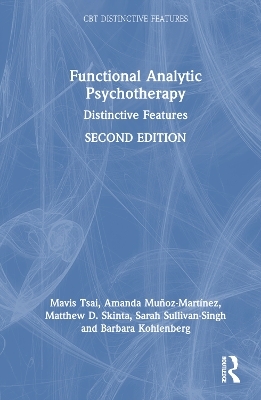
Functional Analytic Psychotherapy
Routledge (Verlag)
978-1-032-69485-6 (ISBN)
Following in the steps of the first edition, Functional Analytic Psychotherapy: Distinctive Features, 2nd Edition, provides a history, context, and building blocks for a behavior therapist to incorporate Functional Analytic Psychotherapy (FAP) into their work.
This new volume updates material based upon research that has occurred since the first edition, as well as philosophical and theoretical shifts in behavior therapy, such as an emphasis on FAP as a process-based therapy. Each FAP principle is presented in terms of its intended purpose and is clearly linked to the underlying theory, providing clinicians with a straightforward guide for when and how to apply each technique. Practical tips have been added to aid in case conceptualization and the integration of a FAP framework into other process-based, behavioral conceptualizations. The added breadth and depth also emphasize FAP’s unique role in meeting the needs of diverse and marginalized people and applying FAP across diverse settings.
This book will be an important read for any student, trainee, or CBT practitioner.
Amanda Muñoz-Martínez is a clinical psychologist, certified FAP trainer, and an associate professor at the Universidad de Los Andes, Colombia. Matthew D. Skinta is an associate professor of psychology and affiliated faculty of women and gender studies at Roosevelt University. Sarah Sullivan-Singh is a psychologist, clinical instructor in the psychology department of the University of Washington, and a certified FAP trainer who specializes in working with adults experiencing health-related adversity. Barbara Kohlenberg is a professor at the University of Nevada Reno School of Medicine and is a clinical psychologist interested in contextual behavioral science, particularly FAP and Acceptance and Commitment Therapy (ACT). Mavis Tsai is a senior research scientist at the University of Washington and co-creator of FAP.
About the Authors
Preface
Acknowledgements
Part 1 The Distinctive Theoretical Features of FAP
1 The Historical Roots of Functional Analytic Psychotherapy
2 FAP as a Principle-based Therapy
3 What's the Function?
4 Verbal Behavior: The Roots of FAP Interactions
5 The Therapy Relationship Is a Real Relationship
6 The Central Role of Natural Reinforcement
7 Clinically Relevant Behaviors (CRBs)
8 Interpersonal Repertories: The Core of FAP Intervention
9 Emotions and Feelings
10 Development and Support of the Self
11 Cognitions and Beliefs
12 A Model for Intimacy: Living with Awareness, Courage, and Love (ACL)
13 Vulnerability in Context
14 Ethical Issues and Precautions
15 Diversity, Privilege, Power, and Justice in FAP
Part 2 The Distinctive Practical Features of FAP
16 Setting the Stage: Creating a Sacred Space of Trust and Safety
17 Functional Analysis and Case Conceptualization in FAP
18 The Treatment Rationale and the Beginning of Therapy
19 Introduction to the Five Rules
20 Observing (Rule 1)
21 Evoking (Rule 2)
22 Reinforcing/Consequating (Rule 3)
23 Noticing our Effect (Rule 4)
24 Generalizing and Discriminating (Rule 5)
25 A Logical Therapeutic Interaction in FAP
26 Loss of Connection: Working with Grief in FAP
27 Termination
28 Supervision and Training
29 FAP Implementation in Health Settings
30 FAP as an Integrative Therapy
References
| Erscheinungsdatum | 29.11.2024 |
|---|---|
| Reihe/Serie | CBT Distinctive Features |
| Zusatzinfo | 2 Tables, black and white |
| Verlagsort | London |
| Sprache | englisch |
| Maße | 129 x 198 mm |
| Gewicht | 460 g |
| Themenwelt | Geisteswissenschaften ► Psychologie ► Allgemeine Psychologie |
| Medizin / Pharmazie ► Medizinische Fachgebiete ► Psychiatrie / Psychotherapie | |
| Sozialwissenschaften ► Soziologie | |
| ISBN-10 | 1-032-69485-8 / 1032694858 |
| ISBN-13 | 978-1-032-69485-6 / 9781032694856 |
| Zustand | Neuware |
| Haben Sie eine Frage zum Produkt? |
aus dem Bereich


